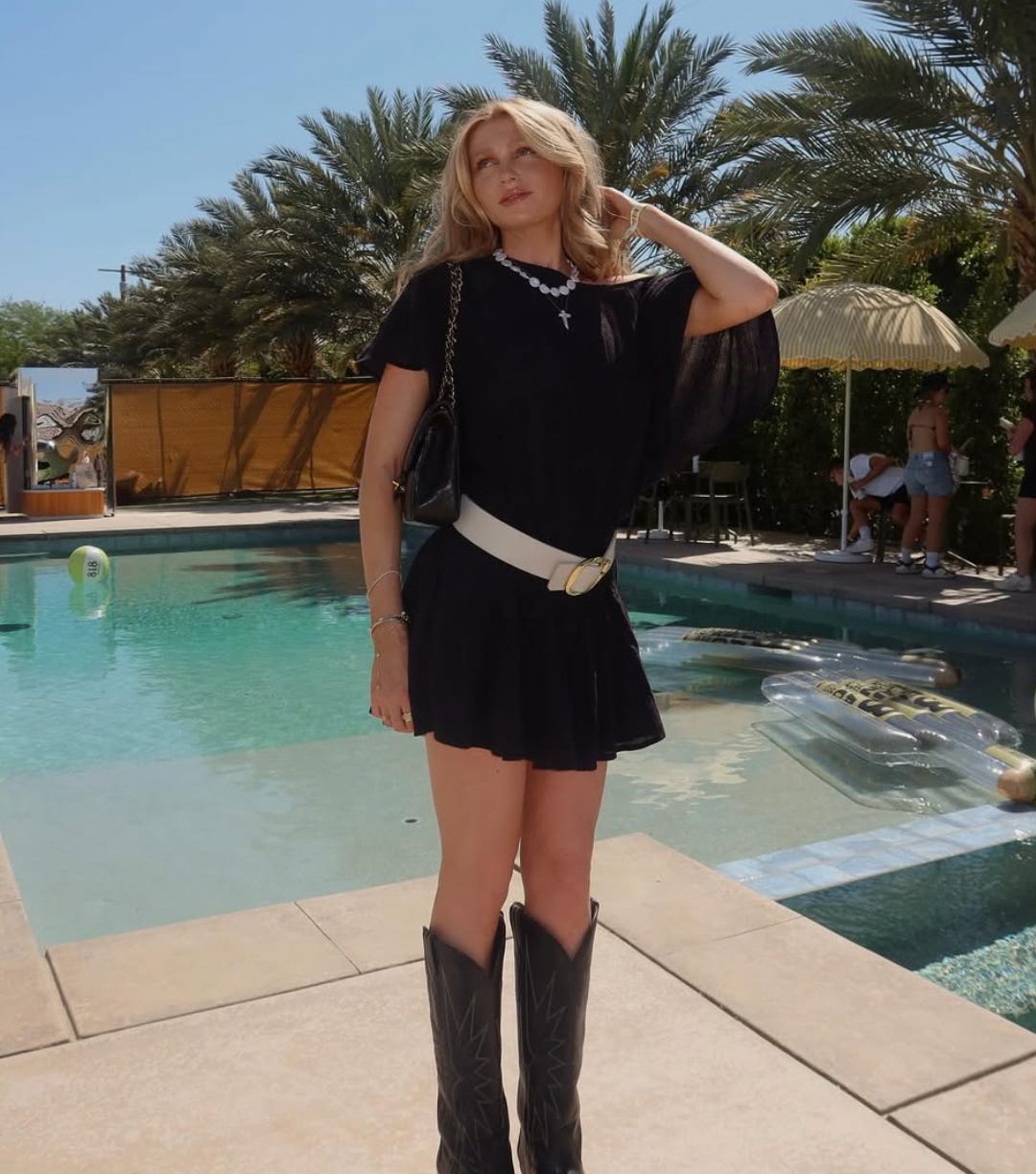Coachella fits are ugly and that’s okay.
How influencer culture is poisoning our sense of self.
2014 was the first time I remember tapping into online discourse about C list celebrities making the yearly pilgrimage from Los Angeles to the Coachella Valley to put on a boho outfit, take pictures, and listen to some music if extra time remained.
2020 marked the year that Vanessa Hudgens had a viral meltdown over the festival being cancelled due to the pandemic. "People are going to die, which is terrible, but like... inevitable?"
This year’s edition could be marked as a completion of a Baudriallardian simulation–no longer a music festival taking place in California, but rather a virtual event unfolding on our own personal black mirrors at home. And let me tell you–people at home are losing their minds.
One of my guilty pleasures at the end of a long day are the subreddits r/LAinfluencersnark and r/NYCinfluencersnark. Snarkers share their hot takes on the latest influencer blunders and gossip about their missteps. As a reality TV show enthusiast and person with a phone, I often see commentary about people I am parasocially connected to, and enjoy lurking through the opinions held by others to compare them to my own.
Was Lexi from Summer House a bad casting, and will she be back for another season? Is it morally wrong to watch the disillusionment of two marriages on The Valley each week? Who was the villain in the prolific Craig and Paige breakup?
Maybe this sounds like gibberish to you if you’re not tapped into American D-list celebrity culture, but for me, it is deeply entertaining. I could claim that I’m purely interested from an anthropological point of view, or launch into my rant about how gossip is actually healthy because it creates accountability for those in power and protects those in vulnerable positions. While these things remain true, it would be dishonest to take such a moral high ground when the truth is I like a little drama from time to time, especially when it doesn’t concern anyone in my real life.
The past week, these two subreddits have been littered with screenshots of influencers at Coachella–the once indie music festival turned TikToker fashion show for those that shill shit on the internet.
I’ll admit it–the outfits are ugly. Skirts that could reasonably be worn as belts, ill-fitting Shein bras, and kitschy cowboy boots seem to be the agreed upon Coachella uniform this year. What interests me however is not the influencer groupthink that has so many people wearing unflattering and ill-fitting clothes, but the general public’s outrage around seeing someone mildly famous look bad in public.
It’s almost as if influencers failing to slay is a threat to snarker’s personal style themselves. Have we become so beholden to trend cycles that we must be spoon fed what to wear, even when our reaction to said trends is repulsion?
The discourse around skinny jeans has been happening for at least 5 years now. Millennials claiming “you’ll have to rip them out of my cold dead hands,” while GenZ melts down about Alix Earle wearing a pair of skinnies a singular time in public. Why do we care about the changing tides of fashion, and why is it so hard to feel comfortable following our own desires?
As trend cycles seem to accelerate, there is a current fixation (at least in the influencer sphere) on the fashion era of my own personal blunder years: early 2000s core. These years coincided with my time as a middle-schooler, and I remember them being distinctly unfashionable.
Even then, as an insecure midwest tween, I had the common sense to know that I didn’t have to wear a dress over jeans just because Hannah Montana did (then and now I find it ugly).
I also feel no pressure to click the Instagram story link from an influencer shilling the latest micro shorts. As someone born with the gift of two eyes and common sense, I know that I am not at the mercy of online trends. My anti-consumerist values also mean that I don’t really buy new clothes anymore. Most of my wardrobe has either been handed down from my mom and grandma or thrifted.
Wearing old clothes has one major fashion benefit: they have already stood the test of time. You don’t need to go lurking on Reddit threads to understand if a piece of clothing you like is trendy enough. You can actually just trust that since it’s already been around the block a few times, it’s probably timeless enough for you to wear.
This instinctual trust is being lost, as I see those chronically online grasping for spoon fed narratives on what to wear, what to buy, and even what to like. One gift I gained from a music education is the trust in my own opinions. My composition professor, Mark, made it very clear that the most important thing about making your own art is that you like it (I believe everyone in the class got an A).
To the classically trained, this notion of complete freedom, as long as you like it, is terrifying. You are meticulously trained for years of your life to be good at fitting in boxes: you play the music exactly as written and follow the director in front of you, often abandoning your own artistic instincts about a piece.
Those indoctrinated by the current social media landscape have much in common with the classically trained musician floundering to write something for themselves for the first time: they have no idea what they like.
Unfortunately for influencers shilling Amazon storefront links, the personal preference gap cannot be fixed through consumption. Actually, you can develop your personal style without buying anything.
At the start of 2025, I embarked on Mandy Lee’s (well known as Old Loser in Brooklyn on socials) 75 hard style challenge. For 75 days you do not buy any clothes, you must take a picture of your outfit in the morning, and document what items in your closet you naturally gravitate towards. By doing this, you might identify items you want to invest in, or try on garments you haven’t touched in years.
The challenge inspired me to shop less. I’ve stopped buying clothes for specific occasions, and try to save a search if I do have the urge to purchase something–resisting the instant gratification that comes with online shopping.
There’s also a second option: making a conscious decision that you don’t care about fashion and want to spend less time thinking about it. Tech CEO extremists of this option wear the same utilitarian outfit every day, but buying things only to replace those that have worn out will suffice.
Even given my conscious decisions about fashion, I still notice a reaction in myself to an utterly preposterous outfit. Maybe it’s fair to be vocal about the flop nature of influencer’s fits, if only in our mind, because whether we like it or not, trends tend to find us. The iconic monologue from Devil Wears Prada illustrates this:
This… “stuff”? Oh, okay. I see, you think this has nothing to do with you.
You go to your closet and you select that lumpy blue sweater, for instance, because you're trying to tell the world that you take yourself too seriously to care about what you put on your back.
But what you don't know is that that sweater is not just blue. It's not turquoise. It's not lapis. It's actually cerulean.
And you're also blithely unaware of the fact that in 2002, Oscar de la Renta did a collection of cerulean gowns. And then I think it was Yves Saint Laurent who showed cerulean military jackets? And then cerulean quickly showed up in the collections of eight different designers. And then it filtered down through the department stores and then trickled on down into some tragic Casual Corner…where you, no doubt, fished it out of some clearance bin.
However, that blue represents millions of dollars and countless jobs.
And it's sort of comical how you think that you've made a choice that exempts you from the fashion industry when, in fact…you're wearing a sweater that was selected for you by the people in this room…from a pile of "stuff."
So, maybe we should be concerned when the world’s ugliest outfit comes across our screen. Or maybe we should use our outrage as a sign that it’s time to close the screen and venture out into the real world, where ugly outfits are much fewer and further between.





